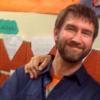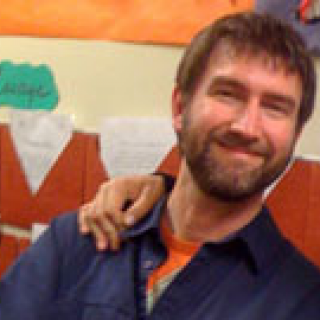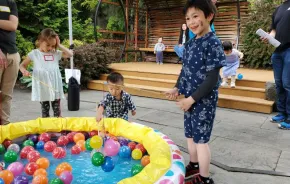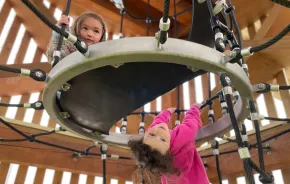 This Friday, Nov. 2, Seattle Public Theater's Youth Education Program will open a double billing of two mysteries. The Real Inspector Hound by Tom Stoppard and Another Dead Caesar, an original comic murder mystery by Seattle playwright Frank Garland.
This Friday, Nov. 2, Seattle Public Theater's Youth Education Program will open a double billing of two mysteries. The Real Inspector Hound by Tom Stoppard and Another Dead Caesar, an original comic murder mystery by Seattle playwright Frank Garland.
What's remarkable is that Frank is only 15 years old.
What led to commissioning a play from the young playwright? Seattle Public Theater Artistic Director Shana Bestock knew she wanted a companion piece for the production of The Real Inspector Hound, which is a parody of Agatha Christie's play The Mousetrap. Seattle Public Theater (SPT) had successfully commissioned youth works from local playwrights for years. But as she was riding her bike one day, inspiration struck. She knew that SPT Youth Program participant Frank Garland, a ninth grader at the Northwest School, was the right person to create a smart, fun, engaging piece that would be a great opportunity for young actors.
According to Bestock, she and Frank met once and talked about what they needed for the play. They came away with a plan and he went off to write. Shana had expected Another Dead Caesar to require more tinkering, but she found the first draft commanding and theatrical. The play that the audience will see during the run starting Friday is close to that first draft.
ParentMap chatted with Frank about how he got his start in theater, what it was like to write Another Dead Caesar and his tips other young playwrights.
1. How long have you been involved in theater?
When I was five years old, I attended CAST (Creative Arts for Small Thespians) at the Seattle Children's Theatre. At the time it was taught by two amazing people, Eli Keltz and Amanda Wiehe. They were both very passionate about letting our creativity run wild. They treated us like peers, and they led us on many adventures within our imaginations. It was there where I first discovered my love of the theater.
2. What was the first play you attended?
I was exposed to theater at a very young age. The first play I saw was probably Winnie the Pooh at the Seattle Children's Theatre when I was three. The first play that I saw outside of Seattle Children's Theater was The Tavern at the Bathhouse Theatre. I was six or seven at the time and a few of the jokes probably went over my head but I still found it hilarious. As for plays that have had an impact on me, there are so many that it's hard to name, but two that come to mind are Next to Normal at the 5th Avenue Theatre and Superior Donuts, which I just saw at the Bathhouse Theater.
3. Did books, movies, TV, or radio have any influence on your interest in script writing or stories that you want to tell?
Yes, definitely. I don't listen to much radio, so I can't say it has had an influence on me. As for TV, I watch The Colbert Report a lot and I'd like to think it has influenced my writing. I've watched a lot of great movies and I'm sure they have inspired my writing, but my biggest influence comes from books. I'm a voracious reader and I believe every book I've read, either good or bad, has influenced my writing in some way. One of my favorite authors is Terry Pratchett. I admire his ability to take the reader to a fantastically yet oddly realistic world and make it hilarious at the same time.
4. How did you get started writing plays?
I've been acting in plays at the Bathhouse ever since I was eight, and I've been writing stories all of my life. I had never thought of writing a play, until a few years ago. I heard about a play writing competition sponsored by Northwest Playwrights Alliance and ACT Theatre. I re-wrote and expanded on a short story I had written about the Greek Gods, submitted it, and was extremely surprised to win second place. It was a huge thrill to have my work performed as a staged reading. Since then I have gotten involved with the Young Playwrights Program at ACT Theatre. I had the good fortune to have another of my plays selected last year for a staged reading at ACT Theatre's Young Playwrights Festival. Both of these were brilliantly acted and directed and that has been hugely inspiring to me.
5. Your play Another Dead Caesar is a comic murder mystery. Have you always been attracted to mysteries? Comedies? What is your favorite story genre?
I am not a huge fan of murder mysteries, I have never written one before. When Shana Bestock commissioned me to write a one-act murder mystery, I had a little difficulty at first. I prefer comedy and believe that every good play, no matter what genre, should have a little comedy in it.
6. What inspired the story for Another Dead Caesar?
I had acted in a performance of Julius Caesar at the Bathhouse Theater a few years ago and I started wondering what would happen if not just Caesar but the actor playing Caesar was killed as well. From there, the seeds for Another Dead Caesar began to take root.
7. What have you learned from the experience of staging your play?
It was very interesting to see my play brought to life. It's a learning experience to see someone else's interpretation of my characters. Sometimes they do it exactly the way I intended, sometimes it seems completely wrong to me, and other times it's far better than what I had imagined in my head. The hardest thing to me as a playwright was going through the editing process and learning to let go of parts of the play that had to be cut for length.
8. What's your writing process?
I write very chaotically. I don't usually plot out my plays. I simply create a few characters and let them loose. Sometimes my characters go off track and I have to go back and rewrite. They usually wind up at a place I want them to be eventually. I am not saying this is the best way to write. Everyone's writing process is different. My advice to other young playwrights is to experiment. Try plotting out your play step by step, then try writing whatever pops into your head, then try a mixture of both. Figure out what works best for you.
9. Are you interested in branching out to other kinds of writing?
I am definitely going to experiment with other types of writing. I enjoy writing plays, but there are things that you can do with stories that don't work in plays and vice versa. I hope to one day write a book, but right now I am too busy procrastinating.
If you go...
Where: The Real Inspector Hound by Tom Stoppard and Another Dead Caesar by Frank Garland play in a double bill at Seattle Public Theater at the Bathhouse Theater. There is a parking lot a short walk from the theater.
When: Friday-Saturday, Nov. 2-3, 7 p.m.; Sunday, Nov. 4, 2 p.m.; Friday, Nov. 9, 7 p.m.; Saturday, Nov. 10, 2 p.m. and 7 p.m.
Tickets: Tickets for all youth productions at the Seattle Public Theater are first-come, first-serve at the door, available 30 minutes before show times. Tickets are free, with a suggested donation to the scholarship fund. They rarely sell out completely, so you are usually assured of a ticket even if you come at the last minute, but it's always nice to arrive at least 15 minutes early.
More reading: Read an SPT interview with Frank Garland; and a ParentMap interview with SPT's Shana Bestock.
 About the author: John Kubalak is a writer, teacher, volunteer coordinator, raconteur, and scalawag. He does not publish science fiction under the pseudonym Jonathan Black but he does publish a monograph on fatherhood, The Eclectic Dad. He has a son, a daughter, a beautiful wife (and a little dog too!) who are adorable, maddening, zany, and brilliant all at the same time.
About the author: John Kubalak is a writer, teacher, volunteer coordinator, raconteur, and scalawag. He does not publish science fiction under the pseudonym Jonathan Black but he does publish a monograph on fatherhood, The Eclectic Dad. He has a son, a daughter, a beautiful wife (and a little dog too!) who are adorable, maddening, zany, and brilliant all at the same time.











